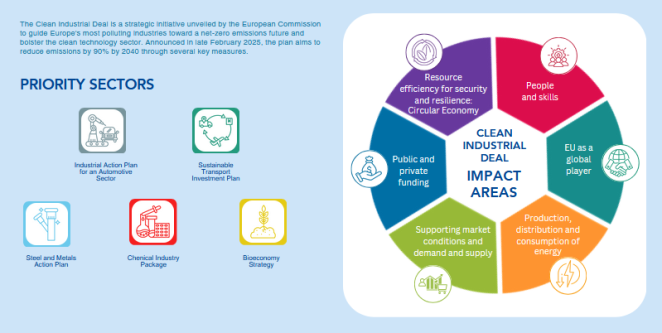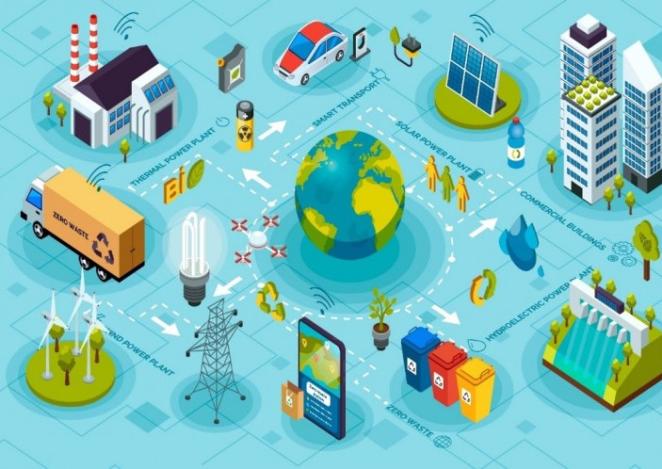The Clean Industrial Deal provides a framework for Europe to decarbonize energy-intensive industries and drive economic growth through clean technology. Since 2023, the GRITH project has also been working on practical, collaborative solutions to enhance industrial sustainability in the North Sea region.

Decarbonizing industries
The Clean Industrial Deal outlines how the European Commission works on conditions for companies to thrive, while supporting the decarbonization of energy-intensive industries, the switch to clean energy, affordable energy, industrial transformation, quality jobs, and circularity.
Just as GRITH does on a regional level, the Deal addresses three parallel challenges: the climate crises and its consequences, concerns about competitiveness and economic resilience with decarbonization as a driver for growth. The Commission identifies six business focus areas for large climate neutral investments in energy intensive industries and clean tech:
- Affordable energy
- Lead Markets
- Financing
- Circularity and access to materials
- Global markets and international partnerships
- Skills

Congestion, challenges, actions, collaboration
Industrial sites in the North Sea region face obstacles in accessing renewable energy due to grid congestion and regulations. GRITH works on solutions like digitalization, smart grids, and energy management to alleviate congestion but more work is needed on all levels. Regional and local collaboration on renewable energy is essential. While GRITH builds these partnerships, it is hindered by the limited implementation of the EU Directive on energy communities. Large consumers should also be able to participate.
GRITH local stakeholders are increasingly concerned about unfair global competition, about Europe’s access to raw materials and about how global players like China and the United States invest more in emerging technologies and energy infrastructure. Especially large-scale industries need constant policy and protection from unfair competition. The Clean Industrial Deal is an important step towards a more robust and self-sufficient economy. However, a European, regional and local favorable environment for innovation, local production and re-industrialization calls for more, targeted action both on a European and regional level.

EU & regional support & upskilling
In our work with industrial sites and enterprises, a positive business case for investment in the energy transition is just as crucial as a market for clean products. Fortunately, especially for SMEs this business case is often more positive than enterprises expected. GRITH shows that regional authorities can increase SMEs’ access to revolving funds, supporting the Clean Industrial Deal.
The GRITH consortium welcomes the role of hydrogen in the Clean Industrial Deal. European support to de-risk and accelerate hydrogen production is key for advancing the energy transition. Regional collaboration enhances decarbonization efforts.
GRITH sees how rising prices and limited raw materials slow the energy transition. An EU framework for circularity could drive innovation. Trust and collaboration are essential, as demonstrated by our sister project "Circular Trust Building."
The Clean Industrial Deal is transforming the North Sea region, but more is needed to make jobs on industrial sites attractive and to tap into unused labour potential. Upskilling and attracting the next generation of workers is crucial.
By aligning with the Clean Industrial Deal’s goals, GRITH empowers local and regional actions to accelerate decarbonization, foster innovation, and strengthen economic resilience across Europe. You can access the full paper with Grith recommendations for the European Commission here.
